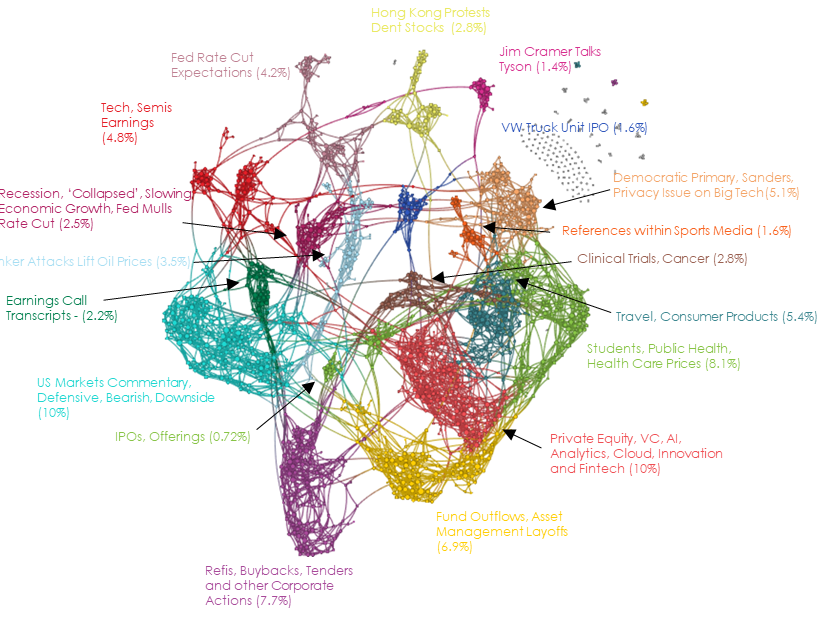Every morning, we run The Narrative Machine on the past 24 hours worth of financial media to find the most on-narrative (i.e. interconnected and central) stories. On the weekend, we leave finance to cover the last week or so in other shifting parts of the Zeitgeist – namely, politics and culture. It’s not a list of best articles or articles we think are most interesting … often far from it.
But these are articles that have struck a chord in narrative world.
Full disclosure this week – these are not the explicit most-connected stories, but they are all among the top 20 out of about 433,000. Close enough for government work, I think. In any case, I found their similarities in subject matter striking, so I hope you’ll forgive me a bit of poetic license on the weekend.
The Long, Hard Road [Cincinnati Enquirer]

Maybe I was the only one who was reminded of Hillbilly Elegy when reading this piece, probably because it takes place in J.D. Vance’s hometown of Middletown, OH. Interestingly, Middletown was in some ways presented in that book as a kind of juxtaposition to the spirit of poverty present in the Kentucky hills that Vance’s family came from.

That text above isn’t from the Cincinnati Enquirer piece, but from a review of Vance’s book by Kevin Williamson. Like Williamson, I do believe that Vance’s 2016 book wasn’t really the story of poverty per se, but the story of the spirit of poverty, this suffocating force that crosses economic classes to drive people into unhappy lives through learned helplessness. The spirit of poverty is a real thing AND the effect of narrative missionaries who capitalize on the bitter realities of true poverty by politicizing it and abstracting it into oblivion. The inevitable result is the redefinition of poverty into the evil influence of outside forces, and never as even the partial result of bad luck, choices and mistakes. The only difference among the parties is who you picked as your outside forces – in the usual case, soulless corporations and unbridled capitalism, on the one hand, or foreign workers or minorities on the other.
This effect is worse in our permanently competitive political Zeitgeist. So, too, are some of the facts about poverty and the middle class, what with expanding corporate margins and all of the very real effects displayed in the excerpts from the Cincinnati Enquirer piece above. Things really aren’t great for the poor and the middle class in a lot of places, and for a hell of a lot of reasons. Not even in Vance’s Middletown, OH. But if what we are seeing in the world of narratives is any indication, our cycle of turning these people and their lives into props for our political plays is only going to get worse.
Health care. Education costs. Inequality. Real issues.
But you’re not going to hear about those things. You’re going to hear about how each politician and journalist wants you to think about those things. You’re going to hear about the policy idea which you will be expected to treat as synonymous with that issue, or else you clearly don’t care about it. It’s a damn shame, because we DO need to talk about all of this. Even those of us – like me – who think that state-designed solutions are nearly never the answer, who believe that a small group of really smart people thinking of solutions is inferior to allowing the emergence of undesigned orders – need to talk about it.
In the Widening Gyre, the suffering of the people is transformed through narrative into political power.
The people keep suffering.
The Black Church and the Black Revolution [Medium]
I am not going out on a limb, I think, to suppose that a middle-aged white guy with libertarian localist tendencies is not the intended audience for this Medium piece. I’d be lying if I told you I grokked much of what the author – a self-described Marxist-Leninist-Maoist – was getting at. But there are two things I thought worthy of note:
- Out of more than 433,000 articles in the NewsDesk database published over the last week that weren’t about financial markets, this was among the 10 most interconnected in terms of language. That means something.
- The long-term effects of the replacement of the Protestant Work Ethic with the Prosperity Gospel in huge swaths of the churchgoing community in the US have yet to be fully comprehended. My opinion? I think I know where much of the spirit of poverty in both Vance’s world and on the Long, Hard Road comes from, and the exploitation of these people by teachers of the mealy-mouthed, milquetoast non-gospel of prosperity is, in fact, among its causes.
In the widening gyre, the suffering of the people is transformed through narrative into political power.
The people keep suffering.

The enduring lesson of the Rwandan genocide [Press Enterprise]

In the widening gyre, the suffering of the people is transformed through narrative into political power.
The people keep suffering.
Fixing the ‘Other’ Georgia [Valdosta Times]






The media should be our agent. They should be cutting off the oxygen to narratives built in service of manipulating people’s real problems in exchange for political power. Instead, they too often behave like principals, believing it is their job to build a particular strain of Common Knowledge. There is no better way to tell us to think than to tell us what “many people” think.
I’m not even sure what I think about what’s going on in The Other Georgia, because this journalist didn’t respect me or anyone else enough to let us decide for ourselves.
‘The Blackest Cloud’ [The Post-Journal (Jamestown, NY]
Ben wrote the below note about markets and investing, but its applicability is much broader.
Specifically, it is a reminder that the idea is not the thing. The courage to act is the thing.
In an existential trade, the COURAGE TO ACT is the thing. It’s the only thing.
How to Live Safely in a Wall Street Universe, by Ben Hunt (2019)
I think the same thing is true for our political, cultural and social lives. It’s what we mean when we say to Make America Good Again. It’s what we mean when we say to have Clear Eyes about those who would transform our fears and concerns about our fellow man into hatred and blame for The Other. It’s what we mean when we say to live with the kind of Full Heart that sends an army of volunteers with chainsaws, food and hands ready to work in a town devastated by a tornado.
The COURAGE TO ACT is ALWAYS the thing.




Start the discussion at the Epsilon Theory Forum